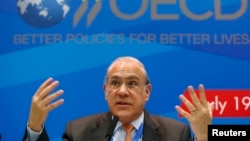A new forecast says that global economic growth has slowed this year and will not advance as fast as once thought for next year.
The Paris-based Organization for Economic Cooperation and Development said Tuesday the world economy will grow by 2.7 percent this year and 3.6 percent in 2014. Both figures are lower than predicted in May by the 34-nation research institution for developed democracies.
The OECD's secretary-general, Angel Gurria, said the world economy faces "potential downside risks." He said the worrisome issues include the ongoing "fiscal brinkmanship" in the United States, unresolved banking problems in Europe's 17-nation euro currency bloc, high debt in Japan and slowing growth in the world's emerging economies.
Gurria said the world economy is only advancing at a reduced pace.
"Why is it that the world economy is not doing better or that the OECD part of the world economy is not doing better? Well, because all the cylinders are at half speed or less," he said. "We can't get it out of first gear. No surprises here. A legacy of the crisis and the traditional sources of growth going slow."
Gurria said that emerging economies in Brazil, Russia, India, Indonesia, China and South Africa have been "big machines of growth." He said that while China, the world's second biggest economy after the United States, has regained strength in recent months, other emerging economies have slowed.
The Paris-based Organization for Economic Cooperation and Development said Tuesday the world economy will grow by 2.7 percent this year and 3.6 percent in 2014. Both figures are lower than predicted in May by the 34-nation research institution for developed democracies.
The OECD's secretary-general, Angel Gurria, said the world economy faces "potential downside risks." He said the worrisome issues include the ongoing "fiscal brinkmanship" in the United States, unresolved banking problems in Europe's 17-nation euro currency bloc, high debt in Japan and slowing growth in the world's emerging economies.
Gurria said the world economy is only advancing at a reduced pace.
"Why is it that the world economy is not doing better or that the OECD part of the world economy is not doing better? Well, because all the cylinders are at half speed or less," he said. "We can't get it out of first gear. No surprises here. A legacy of the crisis and the traditional sources of growth going slow."
Gurria said that emerging economies in Brazil, Russia, India, Indonesia, China and South Africa have been "big machines of growth." He said that while China, the world's second biggest economy after the United States, has regained strength in recent months, other emerging economies have slowed.





